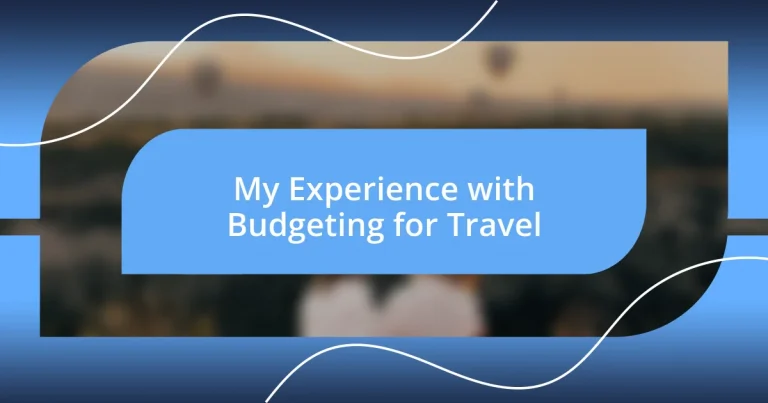Key takeaways:
- Effective travel budgeting involves categorizing expenses into transportation, accommodation, and activities, while allowing a buffer for unexpected costs.
- Setting specific travel budget goals helps prioritize spending on meaningful experiences and prevents impulse buys, enhancing the travel experience.
- Researching costs diligently and remaining flexible with your budget can lead to memorable discoveries and effective management of unexpected expenses during travels.
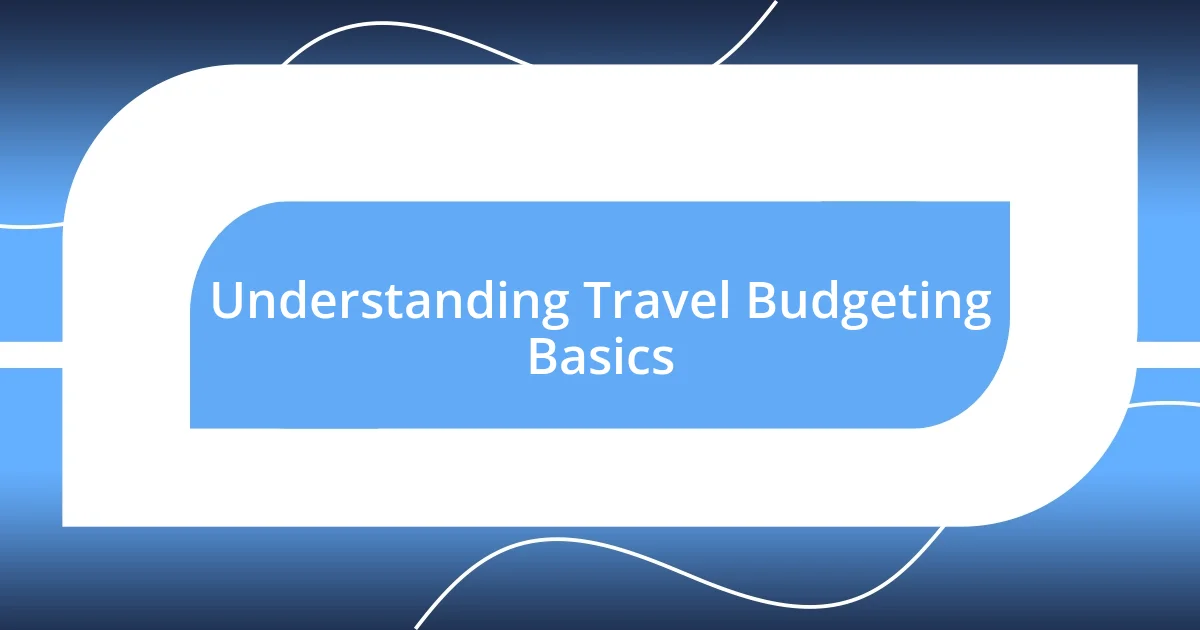
Understanding Travel Budgeting Basics
Travel budgeting is more than just crunching numbers; it’s about creating a roadmap for your adventure. When I first started budgeting for my travels, I vividly remember the excitement mixed with anxiety. How could I maximize my experiences without breaking the bank? I quickly realized that having a solid budget not only eases stress but also allows for spontaneity in my travels.
One of the essentials of travel budgeting is knowing how to categorize your expenses. For me, I like to break it down into three main areas: transportation, accommodation, and activities. This organization helps me visualize where my money is going. Have you ever found yourself splurging on a lavish dinner but then regretting the cheap hostel? It’s all about balance and making conscious choices that align with your travel priorities.
Moreover, it’s crucial to consider a buffer for unexpected expenses. On my last trip, I was caught off guard by an unplanned excursion that turned out to be a highlight! Having a small cushion in my budget for surprises adds an element of freedom to my travels. This flexibility transforms what could be stressful moments into delightful opportunities. How do you handle unexpected travel expenses?

Setting Your Travel Budget Goals
Setting your travel budget goals is a crucial step that I’ve learned to approach with enthusiasm. When I started setting my goals, I realized it wasn’t just about listing numbers—it’s about envisioning the experiences I wanted to create. For example, during my recent trip to Japan, I decided early on that I wanted to indulge in a traditional tea ceremony and sample authentic sushi. By earmarking funds specifically for these experiences, I not only stayed within my budget but also lived richer moments that I’ll cherish forever.
I always recommend prioritizing your goals based on what truly matters to you. For instance, if hiking in the Alps is your dream, it might make sense to allocate more of your budget towards gear or guided tours. Personally, I’ve found it incredibly empowering to adjust my savings strategy based on these priorities. The clear focus helps prevent impulse spending on things that don’t align with my travel vision, like fancy hotels when I’d rather splurge on unique activities.
To help visualize your goals, I created a comparison table that can adapt based on what experiences resonate with you—think about what excites you and how you can balance it with your financial reality.
| Priority | Example Allocation |
|---|---|
| Transport | 20% |
| Accommodation | 30% |
| Activities | 40% |
| Buffer | 10% |

Researching Travel Costs Effectively
Researching travel costs effectively can truly make or break a trip, and I’ve learned this firsthand. When planning my trip to Spain, I found that spending a little time diving into various websites and travel forums offered insights I couldn’t have imagined. I remember discovering a local travel blog that shared lesser-known attractions and meals that were delicious yet affordable. It really opened my eyes to experiences that fit within my budget while still feeling special.
To make your research more impactful, consider these steps:
- Use multiple sources: Look for travel websites, blogs, and forums to get varied perspectives on costs.
- Check local currency rates: Staying updated on exchange rates can help you make smarter decisions about your spending.
- Explore off-peak travel options: Sometimes visiting a destination in its off-season can lead to significant savings on accommodations and attractions.
- Create a cost comparison list: Jot down estimates for transportation, lodging, and activities from different sources to see where you can save.
- Don’t forget about hidden fees: Always read the fine print to uncover potential extra costs, whether it’s for flights, accommodations, or activities.
Every little detail adds up, and I’ve found that combining practical research with personal insights can lead to unforgettable and cost-effective adventures.
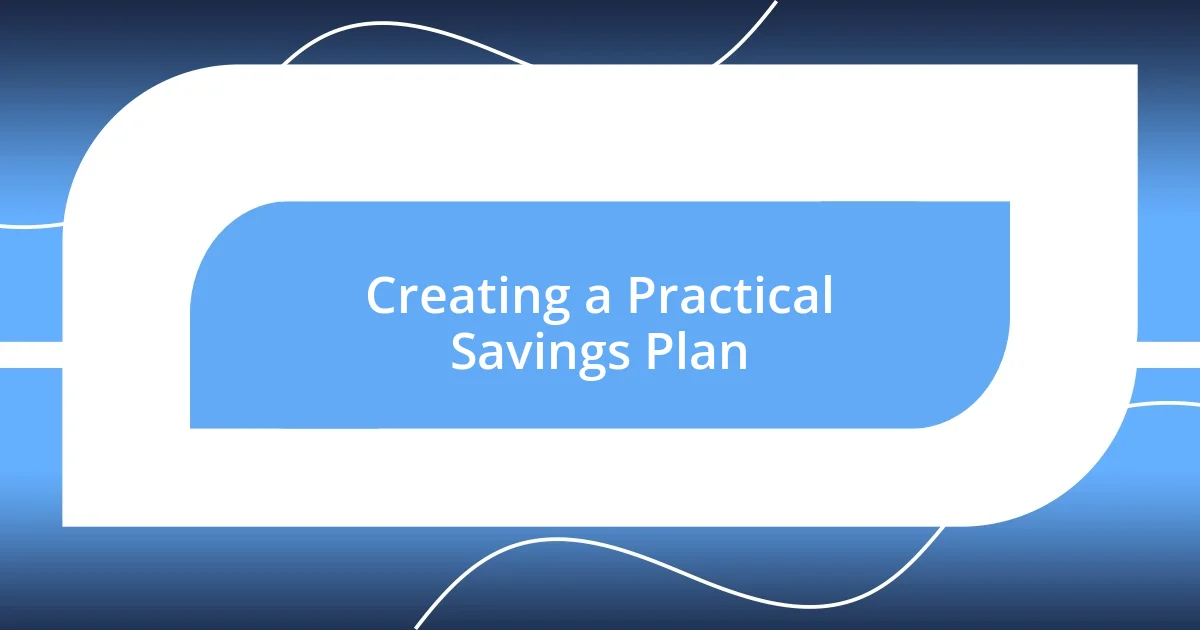
Creating a Practical Savings Plan
Creating a practical savings plan has been a game-changer for me. When I decided to save for my trip to Italy, I set a monthly savings goal that felt attainable without compromising my day-to-day life. I still recall the motivation that surged through me each time I slid a few dollar bills into my travel jar—each contribution made my dream feel closer and more real.
One approach that worked particularly well for me was setting up a dedicated savings account. The moment I labeled it “Italy Fund,” I felt a shift in my mindset. It became not just about saving money; it was about funding experiences. I remember those moments when I resisted the urge to spend on little luxuries—like that overpriced coffee—because I could envision sipping espresso in a quaint café in Florence instead. Isn’t it fascinating how a clear goal can redefine what we view as necessary versus what brings joy?
I also recommend tracking your progress. Each month, I would update a simple spreadsheet to reflect how much I had saved versus how much I aimed to save. Seeing those numbers grow brought a sense of accomplishment that fueled my determination. Plus, every time I hit a milestone, I’d treat myself to something small, like a new guidebook. It’s all in the balance, right? What minimal rewards can keep you motivated while pushing you toward a bigger adventure?
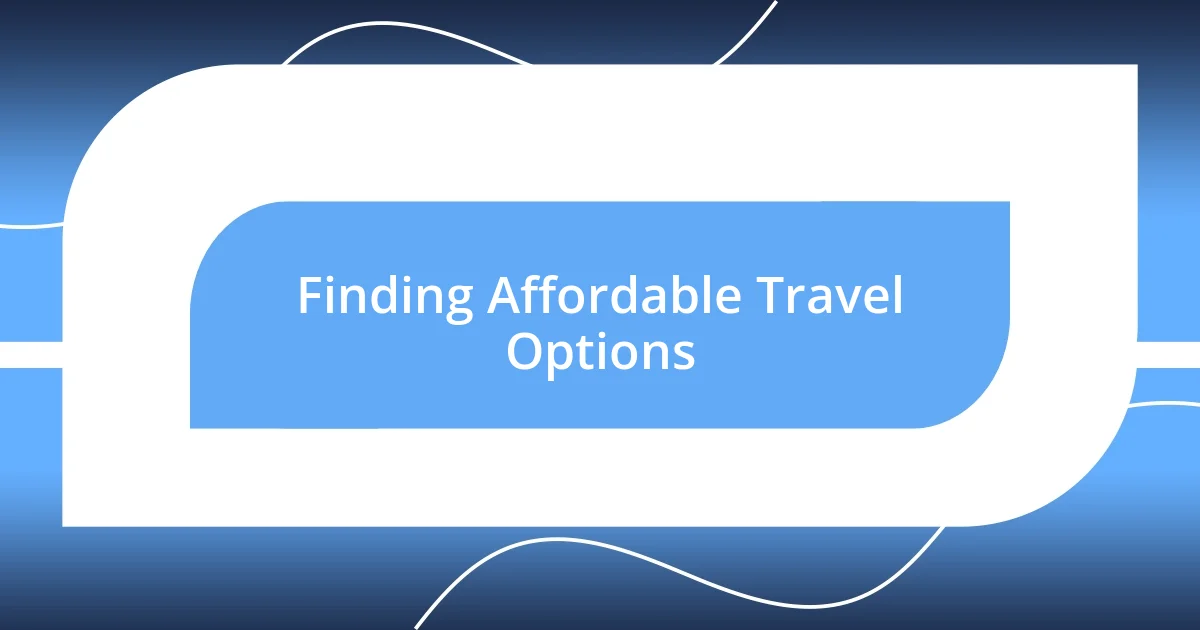
Finding Affordable Travel Options
Finding affordable travel options has become a delightful challenge for me over the years. I remember booking a flight to Thailand during a flash sale; it was as if I stumbled upon buried treasure! I felt exhilarated by the prospect of saving a few hundred dollars simply by choosing the right day to purchase my ticket. Have you ever experienced that rush of excitement from snagging a deal? It’s like an adrenaline boost for your travel plans.
One invaluable habit I picked up is signing up for fare alerts. The anticipation of notifications popping up in my inbox about discounted flights can really make a difference. I recall a particularly memorable moment when I received an alert for round-trip tickets to New Zealand that were nearly half off. It was a spontaneous decision that led to one of the most breathtaking trips of my life. If you haven’t tried this yet, why not take a moment to explore some options for your next potential adventure?
In addition to flight deals, seeking out budget accommodations has transformed my travel experience. I’ve often turned to home-sharing platforms or hostels, where I’ve met incredible travelers and local hosts. I’ll never forget the warmth of the family who shared their home in Barcelona; not only did I save money, but I also gained insights that only a local could provide. Isn’t it interesting how the way we choose to stay can enrich our journeys in such unexpected ways? The lesson here is to remain open to different possibilities—sometimes the most affordable options lead to the richest experiences.
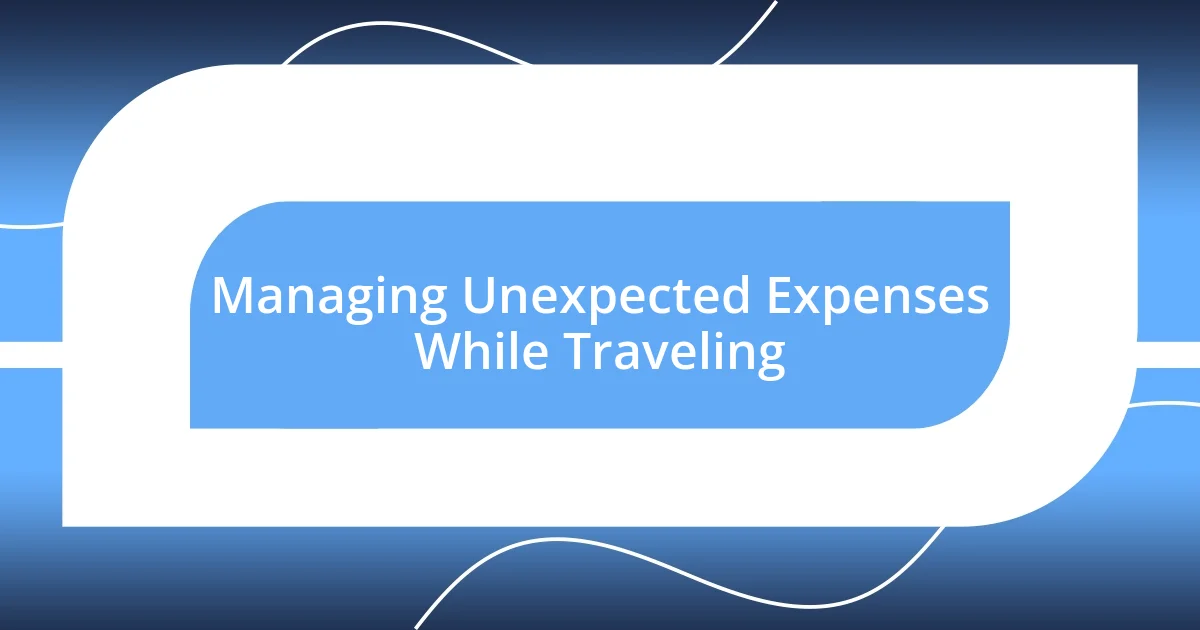
Managing Unexpected Expenses While Traveling
Managing unexpected expenses while traveling can be one of the most daunting aspects of adventure. I remember a trip to Mexico where my plans took a sudden turn when my suitcase was lost. The initial panic was overwhelming, but I took a deep breath and reminded myself that these moments often lead to unexpected discoveries. In the end, I found a local market selling beautiful handmade bags, which not only replaced my lost suitcase but also added a unique piece to my travel story! Have you ever had a similar experience where something unplanned transformed into a hidden gem?
To cushion the blow of surprise expenses, I’ve learned the importance of maintaining a flexible budget. For instance, during a recent trip to Japan, I allocated a specific portion of my budget to “wiggle room.” This allowed me to splurge on delicious street food or impromptu train rides to nearby towns without guilt. I often ask myself, what moments truly enrich my travels? Answering this helps prioritize my spending, ensuring unexpected costs don’t sour my experience.
Another strategy I swear by is packing a mini-emergency fund. I always stash away a small amount of cash in a separate pocket or hidden compartment of my bag. This came in handy when I found myself needing to pay for a last-minute hotel change during a sudden downpour in Iceland. The relief of having that little safety net meant I could make decisions without feeling frantic about finances. Isn’t it comforting to know you’ve prepared for the unpredictable nature of travel?

Evaluating Your Travel Budget Success
Evaluating the success of your travel budget is more than just tallying expenses; it’s about reflection and embracing the learning process. After a recent trip to Greece, I sat down with a cup of coffee and a notebook, eager to analyze my spending. I discovered that while I had splurged on a killer sunset dinner, my choice to pack snacks saved me quite a bit. Isn’t it amazing how some decisions can lead to joy and savings simultaneously?
One key takeaway for me has always been to revisit the goals I set before traveling. Did I prioritize experiences over material purchases? Did I stay within my estimated budget? For instance, I once meticulously planned to adhere to a tight budget during a backpacking trip through Southeast Asia, only to realize that sharing experiences with fellow travelers was worth an extra dime. Reflecting on these choices helps me appreciate the journey and plan better for the next one.
Ultimately, I find that evaluating travel budget success is about balancing satisfaction and financial wisdom. After returning from my adventure, I like to write down what I would change next time. Did I manage to engage with the local culture and stick to my budget? Just the other day, I was reminiscing about my vacation in Portugal. I realized I could have embraced more public transport instead of taxis. What lessons have you taken from your past travels that helped shape your future itineraries?












